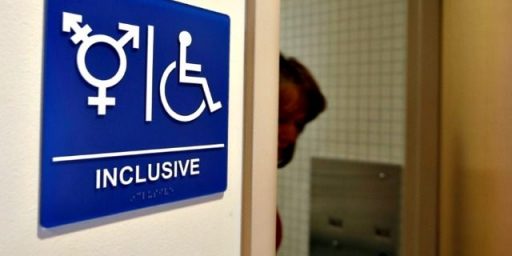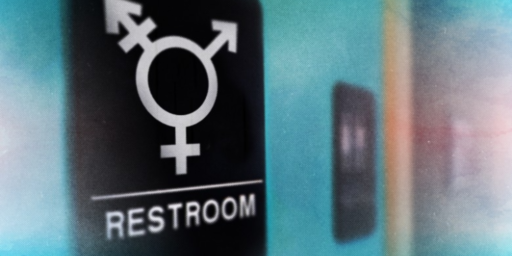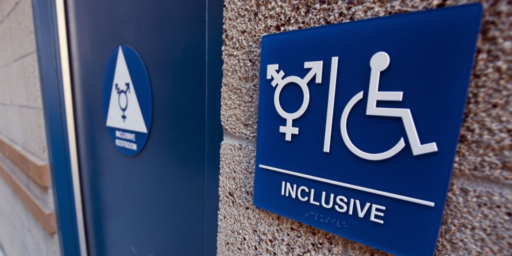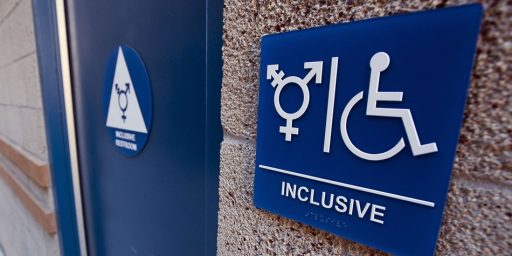SCOTUS Lets Ruling In Favor Of Transgender Student Bathroom Access Stand
The Supreme Court let a ruling against students opposed to a school district policy allowing transgender students to use the bathroom corresponding to their gender identity stand.
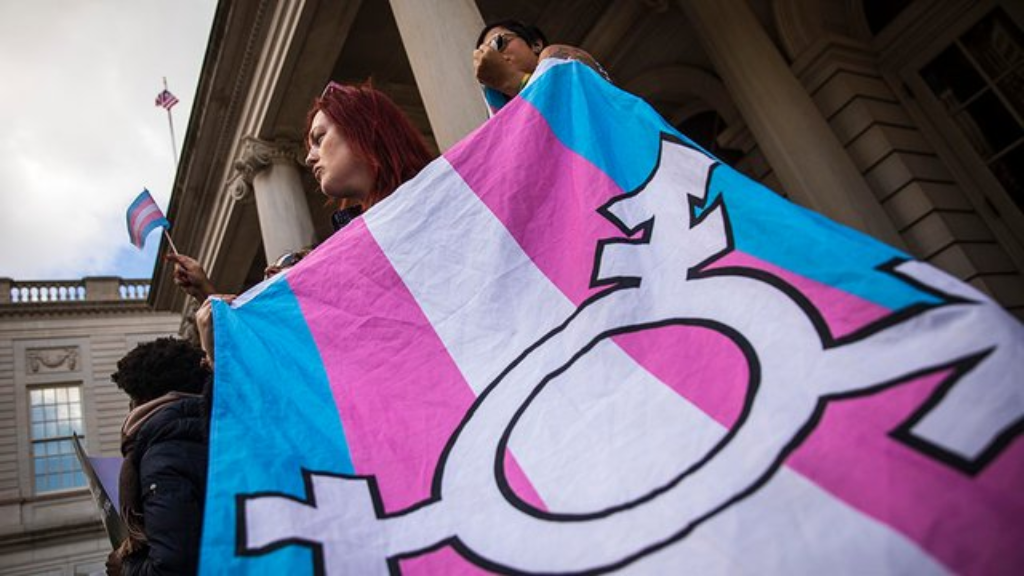
Yesterday, the Supreme Court rejected an appeal of a case brought by students at a Philadelphia area school district who claimed that the district’s policy allowing transgender students to use the bathroom corresponding to their gender identity:
The Supreme Court declined on Tuesday to hear a case challenging a Pennsylvania school district’s bathroom policy allowing transgender students to use bathrooms of their choice.
The conservative Alliance Defending Freedom represented a group of students in the case, Doe v. Boyertown Area School District, alleging that the district’s policy violates student privacy. ADF has represented students and school districts in similar lawsuits across the country.
The Supreme Court’s decision leaves standing the U.S. 3rd Circuit Court of Appeals unanimous ruling last year that the Pennsylvania school district can continue allowing transgender students to use bathrooms that align with their gender identity. The court later revised its ruling, toning down language that said federal law protects that right.
Michael Levin, counsel for the school district, said the Supreme Court recognized the case wasn’t worthy of further review and “understood the false narrative that is being repeated by the Plaintiffs that their privacy rights were violated.”
“The Boyertown Area School District provides private bathrooms and locker rooms to all students who do not feel comfortable sharing such (spaces) with others, transgender or cisgender,” Levin said in a statement. “The school district’s approach to offer separate and private bathrooms, locker rooms and private spaces to students who desire greater privacy is the common-sense approach that the Plaintiffs claim that they want.”
The ACLU represents Aidan DeStefano, a student at Boyertown Area Senior High who is transgender, and the Pennsylvania Youth Congress, a coalition of LGBTQ youth leaders and youth organizations.
The ACLU tweeted: “Our client Aidan was accepted as the boy he is — this should be every student’s experience. This is a victory for trans students and educators nationwide.”
The group added, “Trans students are not a threat. This move means school districts can continue to allow trans students to participate in school activities, and use restrooms and locker rooms, that match their gender.”
But the ADF said in a statement that the high court should have reviewed the case. “Students struggling with their beliefs about gender need compassionate support, but sound reasons based on common sense have always existed for schools to separate male and female teenagers in showers, restrooms, and locker rooms,” said ADF Senior Counsel and Vice President of Appellate Advocacy John Bursch.
(…)
ADF filed a petition with the Supreme Court in November asking it to review the ruling upholding the policy. The petitioner they refer to as “Joel Doe” was “embarrassed and confused” when encountering a transgender student in the locker room, according to the petition. He was “marked down in gym class” for failing to change his clothes, and “he eventually felt forced to leave the school entirely,” the petition states.
The school district, responding in January, argued no students are required to share a restroom or locker room with transgender students and the school district has a “compelling interest” in protecting transgender students. The ADF failed to show that the lower courts abused their discretion in finding that the school district’s policy does not violate Title IX, the federal law that protects against sex-based discrimination in federally funded education programs, the school district stated.
More from Philly.com:
The U.S. Supreme Court declined Tuesday to consider a challenge to the Boyertown Area School District’s policy allowing transgender students to use restrooms and locker rooms that correspond to their gender identity.
In so doing, the justices rejected the latest appeal from a conservative legal organization representing six students who say they felt uncomfortable after spotting transgender teens using the restrooms of their choice.
The decision, issued in a one-line order, lets stand a lower-court ruling that has shaped a growing body of law surrounding the question of whether federal statutes protect against discrimination based on gender identity. It also effectively ends a legal fight that has roiled the Berks County school district since 2017.
That issue has become more fraught in recent years with President Donald Trump’s decision to roll back Obama-era protections soon after he took office.
Ria Tabacco Mar, a senior staff lawyer with the American Civil Liberties Union, hailed the Supreme Court’s decision.
“This is an enormous victory for transgender students across the country,” said Mar, who intervened in the case on behalf of the Pennsylvania Youth Congress, a coalition of LGBTQ youth leaders.
“Boyertown’s schools chose to be inclusive and welcoming of transgender students. … This lawsuit sought to reverse that hard-won progress.”
Meanwhile, Christiana Holcomb, legal counsel for the Alliance Defending Freedom, the Christian advocacy law firm that represented the suing students, vowed that her firm’s fight on the issue would continue — even if the Boyertown case was over.“We hope the Supreme Court will eventually weigh in to protect students’ constitutional right to bodily privacy,” she said. “All schools, including [Boyertown], should be providing compassionate support for those dealing with gender dysphoria, but they should do it in a way that protects the privacy of all students.”
The Supreme Court’s decision on Tuesday leaves standing an earlier ruling by a three-judge panel of the U.S. Court of Appeals for the Third Circuit, which in an unusual move last year issued its decision upholding the policy less than 20 minutes after hearing the arguments of the protesting students.
Circuit Judge Theodore McKee said at the time that the students had failed to show that they were irreparably harmed by the school district’s policy — especially given the steps the Boyertown district had taken to accommodate those who did not feel comfortable sharing facilities with transgender teens.
The district implemented its transgender restroom policy in 2016 under Obama-era guidelines that required all federally funded school districts to recognize basic transgender student rights and chose to stick with them after Trump eliminated those standards soon after taking office.
To accommodate anyone who was uncomfortable, district officials expanded the number of single-user restrooms, alternative locker rooms, and private stalls across their high school’s campus so that any student could use them, instead, if they preferred.
As I have said before, the fact that the Court has declined to accept a case for review does not establish precedent and we should be careful not to draw unwarranted conclusions from such a decision. At the most it may merely mean that the Court lacked the four Justices necessary to accept a case for review. Why that is the case, and whether or not there were any Justices is something we may never know.
Notwithstanding this caveat, though, it seems clear that this case was a weak vehicle upon which to base a Supreme Court case. There doesn’t appear to me to be sufficient legal merit to the claim that a school policy designed to accommodate the rights of transgender students somehow violated the rights of the rest of the students in the school district. This is especially true when you consider the fact that, at the same time that it implemented that policy the district also expanded the availability of single-user restroom facilities to accommodate students uncomfortable with sharing a bathroom with transgender students. Given that and the fact that the Plaintiffs appeared to represent a minority of the students in the school, the idea that their being “uncomfortable” should mean that transgender students are placed in embarrassing and potentially unsafe conditions is, to put it bluntly, absurd. In short, these students, likely acting through their parents, don’t have a colorable legal claim and need to learn to have tolerance and respect for the rights of their fellow students.
This decision by the Supreme Court to let the Third Circuit ruling stand is the latest in a long series of victories for transgender students in public schools in the past several years, most of which have not gone beyond the Federal District Court or Court of Appeals level. All of these cases seem to point in one direction:
- In August of last year, for example, a Federal Court Judge in Indiana ruled that a transgender student must be allowed to use the bathroom that corresponds to their gender identity.
- Several months before that, in a case somewhat similar to the one that the court dealt with yesterday, a Federal Judge in Oregon rejected efforts by a group of parents to block a school district policy that permits transgender students to use the restroom that confirms to their gender identity.
- Two months earlier, a Federal Judge in Virginia breathed new life into the case of Gavin Grimm, a transgender student in Glouster County, Virginia who was challenging the school district’s policy that barred him from using the male restroom facilities notwithstanding the fact that he is genetically female. Grimm had previously won his argument before both the District Court and the Fourth Circuit Court of Appeals, but his case was sent back to the District Court by the Supreme Court rather than receiving a ruling on the merits. The new ruling in Grimm’s favor sets the case up for an eventual return to the Supreme Court.
- At the same time as the decision in the Grimm case, the Third Circuit Court of Appeals upheld the policy of a suburban Philadelphia area school district that allowed transgender students to use the restrooms that match the gender they identify with.
- Another victory for transgender rights came in December 2017 when a District Court Judge in Illinois ruled in a case similar to the one in Oregon that had been brought by a group of parents seeking to bar a school district from enacting a policy that allowed transgender students to use the bathroom and locker rooms matching their gender identity. In that case, the Judge sided with the school district and the transgender student at the center of the case, and against the parents seeking to overturn the policy.
- In May 2017, meanwhile, the Seventh Circuit Court of Appeals ruled in favor of a Wisconsin student who had sued his school district after it sought to bar him from using the restroom facilities that match his gender identity.
The key thing to notice here, of course, is the fact that all of the cases that have been brought in Federal Court regarding this issue, or at least all those that have received public attention, the Courts have ruled in favor of the rights of transgender students. Indeed, these rulings have largely all been consistent with each other, which may be one of the major reasons why the Court has declined to hear this case and the Justices don’t appear inclined to take up the issue any time in the future. Whether that will change in the future if and when we get a Federal Court ruling that is contrary to the trend noted above remains to be seen.

